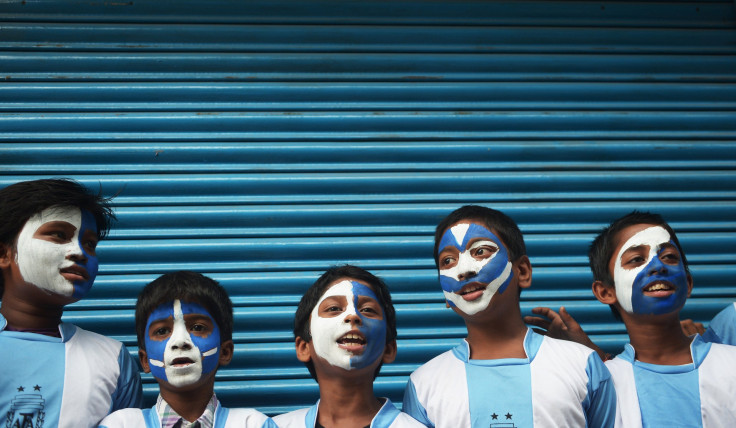Argentina Vs. Netherlands: What Their World Cup History Tells Us

The winner of Wednesday's semifinal match between Argentina and the Netherlands will decide which team gets to face off against Germany in Rio de Janeiro on Sunday in the 2014 World Cup final after Germany destroyed Brazil 7-1 on Tuesday afternoon in their semifinal.
The highly anticipated match in Sao Paulo pits two supremely talented teams from opposite sides of the Atlantic against one another in an epic contest informed by decades of history.
Argentina has a long tradition of soccer excellence but has not reached the World Cup final since 1990. Getting past the Netherlands and returning to the apex of the sport would be a rebuttal of critics who say that though Argentina has produced some of the world's best players in recent years -- like superstar Lionel Messi, who is looking to up his goal count on Wednesday -- the team's glory days are behind them.
The Dutch have had more success in recent years, reaching the final in 2010, but losing 1-0 in extra time in agonizing fashion to a talented Spanish team. The squad is looking to make it back to the final again and crush the Germans to prove once and for all that the Netherlands, who have lost three World Cup finals and won zero, can bring a trophy home to Holland.
But it's the history between the Netherlands and Argentina that is most interesting and vital to understanding what's at stake in Wednesday's match.
Argentina has won two World Cups, first at home in Buenos Aires in 1978 (over the Netherlands, as it happened) and then eight years later in Mexico City (over Germany). Winning their first World Cup final is what will likely be on the minds of all Dutch fans when the two teams face off again.
The Netherlands has never won a World Cup despite making it to the final in 1974 (when it lost to Germany), 1978 and 2010. Wednesday's match is a chance for the Dutch to beat the team that stole its glory with a score of 3-1 in extra time in 1978. If they do reach the final, they will once again have a chance to exact revenge on Germany for beating them in 1974.
The 1978 final was a controversial, hotly contested game that was still 1-1 at the 90-minute mark. Mario Kempes, that Cup's leading scorer (with six goals), scored first, energizing the home crowd, but the Netherlands' Dick Nanninga was able to tie it up in the last several minutes of regulation playing.
Daniel Bertoni and Kempes ended up adding two more goals in extra time, and the Dutch couldn't answer, leaving them crestfallen as the Argentinian capital exploded in celebration.
The Netherlands team, however, was so dismayed by various controversies that arose during the game that they declined even to attend the ceremonies after it ended. The Dutch alleged that Argentina repeatedly stalled the match, and that they got away with a slew of obvious infractions including blatant handballs and offsides. It was the only time in eight matchups between the two teams that the Argentinians beat the Dutch.
The wounds of the past appear to figure into the pregame mindset of Dutch star Dirk Kuyt, who spoke with FIFA.com about the pressures and motivations heading into Wednesday's match.
"The semifinals are fantastic, but we know what it feels like to lose a World Cup, and we would love to win," he said. "Argentina are a world-class team and they deserve to be in the last four. But we want to measure ourselves against the best, and not only measure, but win. That's why we're here."
Meanwhile, Argentina, a nation with a proud soccer tradition, has its own reasons for yearning for a win on Wednesday. The team has not reached a final since 1990, and expectations are sky-high for Messi and crew to reclaim their place in the history books by topping the Netherlands.
The team is also mourning the loss of 88-year-old Alfredo Di Stefano, one of the all-time great Argentinian players and among the best in the world, and it would surely love to honor his legacy with a trip to the final and a trophy.
The team is also hoping to help Messi -- who has played brilliantly so far -- get a World Cup final under his belt, after his first two World Cups were cut short at the quarterfinal.
© Copyright IBTimes 2024. All rights reserved.





















